Oman bans waterpipes and creates national awareness during COVID-19
Introduction
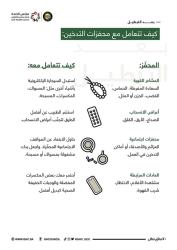 His Majesty Sultan Haitham bin Tarik, Sultan of Oman appointed a Supreme Committee in response to the COVID-19 pandemic. The Committee is tasked with tackling developments resulting from COVID-19 and ensuring preventive measures are in place to curb the pandemic. The Committee is headed by His Excellency the Minister of Interior and is formed from officials representing key ministries and government entities. The Head of the National Tobacco Control committee and Undersecretary of the Ministry of Health is a member of the Supreme Committee. The Ministry of Health is focusing on two main areas in tobacco control: enforcing a ban on waterpipe use in public places, and recognizing World No Tobacco Day 2020 and linking its activities to COVID-19.
His Majesty Sultan Haitham bin Tarik, Sultan of Oman appointed a Supreme Committee in response to the COVID-19 pandemic. The Committee is tasked with tackling developments resulting from COVID-19 and ensuring preventive measures are in place to curb the pandemic. The Committee is headed by His Excellency the Minister of Interior and is formed from officials representing key ministries and government entities. The Head of the National Tobacco Control committee and Undersecretary of the Ministry of Health is a member of the Supreme Committee. The Ministry of Health is focusing on two main areas in tobacco control: enforcing a ban on waterpipe use in public places, and recognizing World No Tobacco Day 2020 and linking its activities to COVID-19.
Ban on waterpipes in public places
The Supreme Committee, on 12 March 2020, issued a ban on use of waterpipes in all licensed outlets effective as of 15 March 2020 for the period of one month. Oman’s Ministry of Health has been in close contact with the three different Omani municipalities, which in their turn took forward this ban across Oman and successfully implemented it. The municipalities issued their orders to ban waterpipes and communicated this widely using their social media platforms especially through Facebook and Twitter. Dr. Jawad Al-Lawati, Senior Consultant and Rapporteur for the National Tobacco Control Committee at the Ministry of Health stated: “When there is a political will, implementation is quite easy, this is the case with the waterpipe ban during the outbreak of COVID-19”. The ban is still in place because restaurants and cafes are still closed to date and mass gatherings are disallowed.
Recognition of World No Tobacco Day and linking its activities to COVID-19
To coincide with World No Tobacco Day 2020, the Department of Health Promotion and Health Education at the Ministry of Health developed a number of video clips linking tobacco use to the transmission of the virus that causes COVID-19. The videos were aired at peak times during news breaks. Key television programmes hosted physicians to talk about the topic. Dr. Ahmed Al-Wahaibi, a consultant and healthcare physician, was hosted on national radio and the main TV channel to talk about the risks of tobacco use and COVID-19. Oman’s Ministry of Health used its social media platforms especially Facebook and Twitter, in cooperation with the World Health Organization (WHO), to disseminate many health awareness and tobacco control messages.
Way forward
The Supreme Committee is continuing to monitor the COVID-19 situation and will move forward accordingly. The Committee is preparing a plan to return to normal activities and there has been some consultation with WHO.
The Ministry of Health has already conducted a study—published in June—to identify the clinical characteristics and outcomes of hospitalized patients with COVID-19 in Oman. Within this study the link between tobacco use and the transmission of the virus that causes COVID-19 has been explored on a sample of 63 patients and there is a view to explore this further in the future.
Related links
Ban on all licensed shisha outlets from Sunday (Oman Daily Observer)
Oman’s Ministry of Health e-portal
Oman’s Ministry of Health (Twitter)
Residents in Oman welcome temporary ban on new shIsha cafes (The Arabian Stories)
Qatar bans waterpipes, creates national awareness and adapts smoking cessation services during COVID-19
Introduction
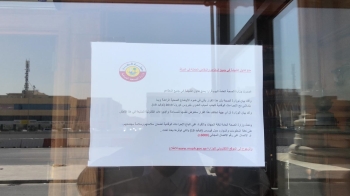 The State of Qatar set up the Supreme Committee for Crisis Management to respond to the COVID-19 pandemic and the Ministry of Public Health is ramping up health awareness activities during this critical period. Qatar’s Ministry of Public Health is focusing on three main areas within tobacco control: enforcing a ban on waterpipe use in public places, a national awareness campaign and smoking cessation services.
The State of Qatar set up the Supreme Committee for Crisis Management to respond to the COVID-19 pandemic and the Ministry of Public Health is ramping up health awareness activities during this critical period. Qatar’s Ministry of Public Health is focusing on three main areas within tobacco control: enforcing a ban on waterpipe use in public places, a national awareness campaign and smoking cessation services.
Ban on waterpipes in public places
Qatar’s Ministry of Public Health, on 10 March 2020, issued a decision banning waterpipes in all restaurants and cafés. The Ministry clarified that the decision came in light of current health conditions as well as in line with precautionary measures to prevent the spread of COVID-19. The decision was published in the official newspaper and disseminated widely across social media platforms. Health inspectors were sent out to enforce the ban and immediately all restaurants and cafés responded by removing waterpipes. Health inspectors are regularly monitoring the implementation of the decision. To date, the implementation rate is 100% with no reports of violations. Some restaurants and cafés have displayed stickers indicating the ban on waterpipes.
The ban on waterpipes in all restaurants and cafés will remain in effect until further notice. Dr Kholood Al Mutawa, Head of Non-Communicable Diseases Section at the Public Health Department, stated: “We expect that the ban will continue till further notice by the Supreme Committee for Crisis Management and the Ministry of Public Health, things will not go back to be the same”. As a result of the ban, waterpipe tobacco mix (Mu’assal) imports have dropped by 40%.
Following the ban, the Ministry of Public Health has worked closely with the Ministry of Commerce and Industry to facilitate the issuance of all licenses for restaurants and cafés except those for waterpipe use. This further ensured the smooth implementation of the banning decision.
Awareness campaign during COVID-19
Qatar’s Ministry of Public Health launched a COVID-19 awareness page on its website, covering all data and updates related to the pandemic. The Ministry is working closely with the Hamad Medical Corporation to run country-wide awareness campaigns. They are coordinating closely to ensure alignment of messages. The messages focus on COVID-19 prevention, protection and risk factors – smoking is highlighted as one of the key risk factors. The awareness campaign uses social media (Facebook, Instagram, Twitter and YouTube) alongside newspapers. The messages are also disseminated through EHTERAZ, a mobile application, developed by the Ministry of Interior which is working closely with the Ministry of Public Health on public health awareness.
Adapting smoking cessation services
The Hamad Medical Corporation Tobacco Control Centre – WHO Collaborating Centre – has shifted its smoking cessation services to phone consultations to enable continuing its operation in light of the current lockdown and restrictions. The consultation includes an extensive assessment to generate a personalized quitting plan, psychological support and a follow-up appointment. In addition, a 24/7 smoking cessation hotline was established by the Centre. The hotline serves as a counselling hub where inquiries are addressed by a smoking cessation specialist at all times. In addition, prescribed medications are home delivered within 24 hours across the State of Qatar without having to attend the healthcare facilities.
These services have proven their success as the Centre witnessed a noticeable increase in their uptake. Accordingly, the Centre tripled the number of functional clinics throughout the week. All patients using the services have expressed their satisfaction with the efficiency of phone consultations and the short time needed to secure an appointment at the Centre. Consequently, this has impacted positively on engagement and response rates.
To further support and promote smoking cessation, a number of WhatsApp groups were created to disseminate health messages and tips amongst patients. These messages and tips were also posted on all the Centre’s social media platforms. In conjunction with these efforts, a number of TV channels have hosted the Centre’s specialists through phone interviews to spread awareness about the link between tobacco use and the transmission of the virus that causes COVID-19. The Centre has also received wide media coverage highlighting its role during this period.
Way forward
The Supreme Committee for Crisis Management has developed a country-wide transition plan to start lifting COVID-19 restrictions and eventually returning to normal activities, subject to the COVID-19 developments across the country. The plan, which started its first phase on 15 June 2020, consists of four phases. The first phase covered two weeks and the remaining three phases to cover one month each, with the last phase starting 1 September 2020.
In the second phase of the plan, shopping malls and markets are planned to open with limited capacity. Within the plan, there is a ban on smoking in front of mall entrances and main gates in addition to removal of all smoking-related aides such as ashtray bins. Malls will be required to place “No smoking” signs outside their main entrances.
The Hamad Medical Corporation Tobacco Control Centre is working on extending the current smoking cessation hotline into a national toll-free quit line.
Related links
Hamad Medical Corporation post on what happens to your body when you quit smoking (Instagram)
Qatar’s Ministry of Public Health bans shisha/hookah in all restaurants and cafés
Qatar’s Ministry of Public Health website coronavirus (COVID-19) page
Saudi Arabia bans waterpipes, creates national awareness and adapts smoking cessation services during COVID-19
Introduction
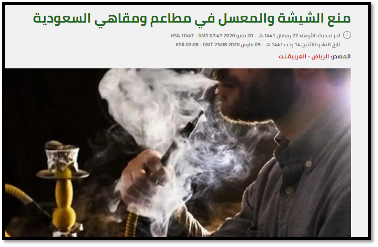 In response to the COVID-19 pandemic, the Saudi Arabia Ministry of Health set up the COVID-19 Follow-up Committee under the chairmanship of His Excellency Health Minister, Dr. Tawfiq bin Fawzan Al-Rabiah. The Committee formed from a number of governmental entities and bodies, and it oversees all COVID-19 related activities and developments. The Committee runs regular press conferences to update the public with the latest developments of the pandemic across the Kingdom. Saudi Arabia’s Ministry of Health is focusing on three main areas within tobacco control: enforcing a ban on waterpipe use in public places, national awareness campaigns and smoking cessation services.
In response to the COVID-19 pandemic, the Saudi Arabia Ministry of Health set up the COVID-19 Follow-up Committee under the chairmanship of His Excellency Health Minister, Dr. Tawfiq bin Fawzan Al-Rabiah. The Committee formed from a number of governmental entities and bodies, and it oversees all COVID-19 related activities and developments. The Committee runs regular press conferences to update the public with the latest developments of the pandemic across the Kingdom. Saudi Arabia’s Ministry of Health is focusing on three main areas within tobacco control: enforcing a ban on waterpipe use in public places, national awareness campaigns and smoking cessation services.
Ban on waterpipes in public places
The Ministry of Municipal and Rural Affairs on 9 March ordered a ban on use of waterpipes in all restaurants, hotels and cafés operating in the Kingdom to limit the spread of COVID-19. The Ministry tweeted: “Waterpipes and tobacco (mu’assal) were banned in cafés and restaurants and in all municipalities as a precautionary measure to preserve the health of citizens and residents from coronavirus”.
Teams from municipalities and from the National Committee for Tobacco Control carried out field inspections around the clock, to ensure that the ban was implemented and followed strictly. To-date, there are no violations to the ban. One of the challenges was dedicating fieldworkers for inspections as organizationally they are part of the public health teams and with the outbreak of COVID-19 most efforts were channeled to it; however, this was resolved quickly thanks to all parties’ enthusiasm and cooperation.
Awareness campaigns during COVID-19
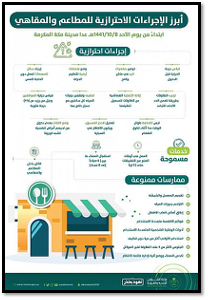 The National Committee for Tobacco Control has run a number of awareness campaigns showing the link between tobacco use and the transmission of the virus that causes COVID-19. Dr Mansour Zafer Alqahtani, Secretary General of National Committee for Tobacco Control and Supervisor of Tobacco Control Programme presented two awareness videos on the topic. The videos were disseminated widely through social media platforms especially Twitter which is followed heavily in the Kingdom. Channel 1—the highest viewed channel in the Kingdom—hosted Dr. Alqahtani to talk about the same topic.
The National Committee for Tobacco Control has run a number of awareness campaigns showing the link between tobacco use and the transmission of the virus that causes COVID-19. Dr Mansour Zafer Alqahtani, Secretary General of National Committee for Tobacco Control and Supervisor of Tobacco Control Programme presented two awareness videos on the topic. The videos were disseminated widely through social media platforms especially Twitter which is followed heavily in the Kingdom. Channel 1—the highest viewed channel in the Kingdom—hosted Dr. Alqahtani to talk about the same topic.
With the start of Ramadan, a themed awareness campaign was launched. During the first week of the Holy month, His Excellency the Minister of Health presented a video on smoking cessation under the title of: “Help us to help you”. The video was aired daily for one week in between programmes and in all breaks.
In addition, the National Committee for Tobacco Control has run a number of awareness campaigns on its website and Twitter account. The campaigns—based on World Health Organization materials—included posters, frequently asked questions, infographics and debunking misinformation.
Adapting smoking cessation services
The National Committee for Tobacco Control has shifted its smoking cessation services to online and phone consultations in light of lockdown restrictions. In spite of a number of technical challenges, this shift has covered 70 clinics across the Kingdom. The Committee has launched a number of initiatives, one of which is the home delivery of medications under the title of “Your treatment will reach you … when you are at home”.
In recognition of World No Tobacco Day 2020, the National Committee for Tobacco Control piloted a virtual platform for smoking cessation clinics for one month. The clinics were accessed by individuals both inside and outside the Kingdom. The platform was publicized on the highest followed news account in the Kingdom, followed by more than 13 million people. The platforms’ link was pinned on the account on World No Tobacco Day 2020. In addition, the hashtag #WorldNoTobaccoDay2020 was activated and was trending in the Kingdom. These online activities were supported by a number of banks and organizations. Saudi Arabia’s Ministry of Health launched an internal communications campaign about cessation services for its staff titled: “Your health is in health … the time has come”. Saudi Arabia’s Ministry of Health has publicized these numerous efforts on its website.
Way forward
The Government of Saudi Arabia has developed a country-wide phased plan to start lifting restrictions and resuming normal activities, subject to the COVID-19 situation across the country. The plan consists of three phases. The first phase started on 28 May 2020. Future plans include continuation of virtual cessation clinics alongside walk-in clinics to provide more accessibility to patients.
Related links
Minister of Health stresses the importance of quitting smoking (YouTube)
Sudan creates national awareness and bans waterpipes during COVID-19
Introduction
The Sudan Federal Ministry of Health ramped up health awareness activities in response to the COVID-19 pandemic. The Ministry is focusing on two main areas within tobacco control: a national awareness campaign and enforcing a ban on waterpipe use in public places.
Awareness campaign during COVID-19
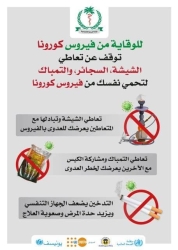 Sudan’s Federal Ministry of Health, on 20 March 2020, launched an awareness campaign focusing on COVID-19 prevention, protection and risk factors. Within that, smoking was highlighted as one of the key risk factors. The campaign—in collaboration with the World Health Organization (WHO)—was in partnership with the United Nations Children’s Fund (UNICEF), United Nations Population Fund (UNFPA), and Save the Children on the funding side and with nongovernmental organizations and the Sudanese Red Cross for wider distribution of messages. The awareness campaign included the use of flyers, posters and billboards on main roads. The posters were clearly displayed in public places such as markets, restaurants and cafés. The posters were also distributed through the Health Promotion Directorate’s Facebook page and social media platforms as well as through WhatsApp messaging.
Sudan’s Federal Ministry of Health, on 20 March 2020, launched an awareness campaign focusing on COVID-19 prevention, protection and risk factors. Within that, smoking was highlighted as one of the key risk factors. The campaign—in collaboration with the World Health Organization (WHO)—was in partnership with the United Nations Children’s Fund (UNICEF), United Nations Population Fund (UNFPA), and Save the Children on the funding side and with nongovernmental organizations and the Sudanese Red Cross for wider distribution of messages. The awareness campaign included the use of flyers, posters and billboards on main roads. The posters were clearly displayed in public places such as markets, restaurants and cafés. The posters were also distributed through the Health Promotion Directorate’s Facebook page and social media platforms as well as through WhatsApp messaging.
Sudan’s Federal Ministry of Health has adapted its communication strategy to reach communities during lockdown and restrictions. Dr Sara Elmalik, Manager of the Health Promotion Directorate at the Federal Ministry of Health stated: “The communication strategy with the community has changed because people are staying at home”. The strategy included the development of a song titled ‘Salam al’ayd ana khalito’ (I had stopped shaking hands). The song was widely disseminated through radio, television and social media platforms. The Ministry is using text messaging to reach out to communities targeting more than 1 million mobile subscribers. The Ministry is launching shortly a message around the dangers of using waterpipes which callers will hear when they are on waiting. In addition, the Ministry is using megaphones to broadcast different announcements to communities. Key television programmes hosted specialists to talk about the use of tobacco and respiratory diseases. Viewers were able to interact with these specialists by calling in and asking questions. In addition, the Khartoum State Tobacco Control Programme conducted a number of awareness raising activities such as the distribution of 20 000 brochures and 10 000 posters in seven localities. The Programme held orientation sessions targeting hotels, restaurants and mosques as well as various audiences such as employees of government and private companies, prisoners and homeless children.
A study is planned, in partnership with UNICEF, to measure the impact of the awareness campaign. A key challenge has been the lack of a specific fund for tobacco control activities—therefore, funds are reallocated to tobacco control from other health promotion activities.
Ban on waterpipes in public places
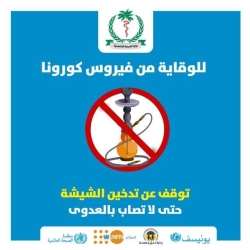 The General Secretariat of the Khartoum State Government issued a decree, on 19 March 2020, banning waterpipe use across Sudan. The decision was published in national newspapers and discussed widely on their pages however, the press service has been discontinued since, due to COVID-19. The decree was met with some resistance and many violations from restaurants and cafés. Using waterpipes in the privacy of homes, especially by youth, still poses a challenge.
The General Secretariat of the Khartoum State Government issued a decree, on 19 March 2020, banning waterpipe use across Sudan. The decision was published in national newspapers and discussed widely on their pages however, the press service has been discontinued since, due to COVID-19. The decree was met with some resistance and many violations from restaurants and cafés. Using waterpipes in the privacy of homes, especially by youth, still poses a challenge.
Way forward
The Government of Sudan has developed a country-wide transition plan to eventually return to normal activities, subject to the COVID-19 situation across the country. Future plans are in place to continue the ban on tobacco use in public places especially waterpipes after the lockdown restrictions are relaxed.
Future plans include: the issuance of a number of ministerial decrees covering graphic health warnings; a total ban on tobacco advertising, promotion and sponsorship including corporate social responsibility activities in line with Article 13 of the WHO Framework Convention on Tobacco Control (WHO FCTC); and rules of engagement with the tobacco industry in line with Article 5.3 of the WHO FCTC. In addition, high level political engagement and advocacy is planned to support the implementation of graphic health warnings.
Future plans also include a tailored mass media campaign to raise awareness of the risks of tobacco products in particular Toomback and waterpipes. Lastly, a number of trainings are planned for all government sectors, nongovernmental organizations and parliament members to help counteract the industry’s interferences and to protect from potential legal issues
Related links
Sudan’s Federal Ministry of Health website
Sudan’s Federal Ministry of Health Facebook
Sudan’s Federal Ministry of Health awareness campaign post on banning waterpipe use (Facebook)








